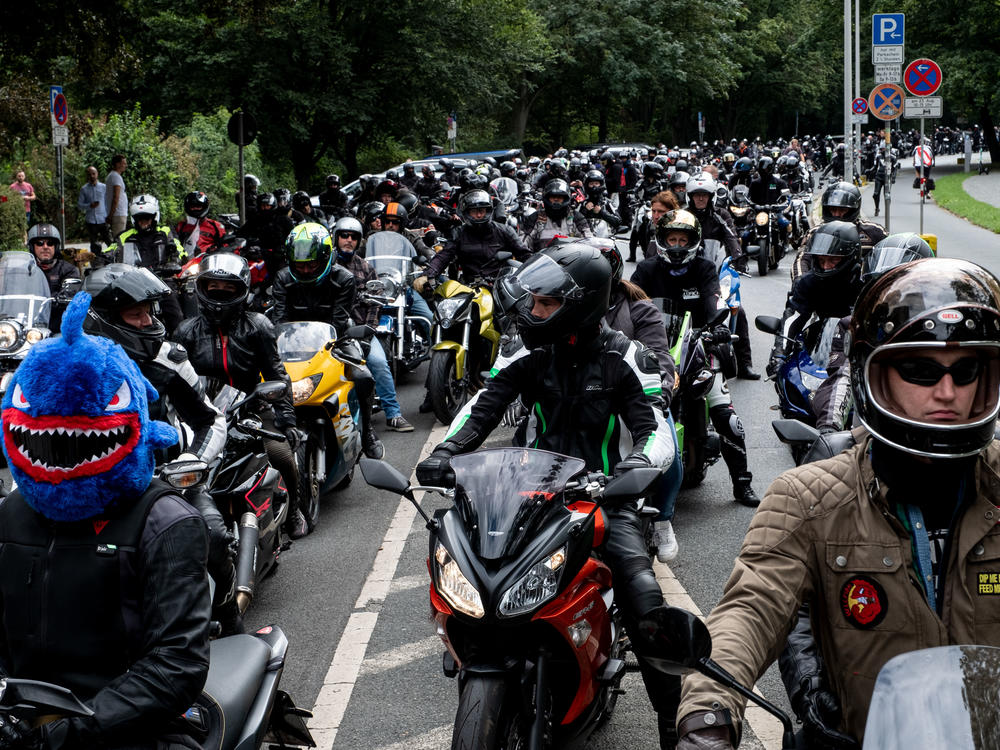Section Branding
Header Content
In Quiet-Loving Germany, Motorcyclists Protest A Possible Ban On Loud Sunday Rides
Primary Content
Noise in Germany keeps a strict schedule. Every night after 10 p.m. and on Sundays, Germans are required by a medley of federal, state and local laws to keep schtum. That means no spin cycles, no vacuuming, no power tools and no mowing the lawn.
As the world went into lockdown this spring, a drop in noise levels was recorded across the globe. But in most of Germany, it wasn't much quieter than an average Sunday, when socializing is done sotto voce and the peal of church bells is about as loud as it gets.
Except along popular motorcycle routes, like the one that goes through Sasbachwalden in the Black Forest.
Sonja Schuchter, the mayor, says on some Sundays, up to a thousand motorcyclists burn rubber through her centuries-old village of half-timbered houses, vineyards and decorative flowers.
"Many villagers have stopped using their gardens on sunny weekends." Schuchter says. "Instead of enjoying their morning coffee on the terrace, they stay indoors and shut all the windows to escape the roar of the engines."
Schuchter says about 20% of the bikers really rev their engines as they ride. "Why on earth motorcyclists think they can make so much racket when we refrain from using our lawn mowers is beyond me," she exclaims.
Michael Lenzen, who lives near Cologne, says he's not the sort of neighbor to get out the hedge trimmer after Sunday lunch, either.
"I wouldn't dream of mowing the lawn or cutting the hedges on a Sunday," Lensen says.
Lenzen is president of Germany's motorcycle association. He's been hitting the open road for 38 years and points outs that while noisy gardening is forbidden on Sundays, anti-noise regulations don't apply to passenger vehicles.
All the same, he appeals to fellow bikers to be considerate.
"We sympathize with people who live near popular biker routes," Lenzen says. "We're asking our members to slow down as they ride through villages."
For some lawmakers, this isn't enough. In May, Germany's upper house, the Bundesrat, proposed banning bikers from popular routes like the one through Sasbachwalden on Sundays and holidays. Outraged, thousands of motorcyclists having been roaring in protest through cities across Germany on Sundays since July.
Depending on the region and the type of noise, residents have the right to complain to authorities or obtain a reduction in rent if their neighbors are an audible nuisance. Noise pollution cases are constantly on court dockets up and down the country.
But even Schuchter says she doesn't want an outright ban, just some respect for state-sanctioned peaceful Sundays.
"Here, like elsewhere in Germany, you simply don't mow your lawn or use loud machinery on a Sunday," she says. "It's not the done thing!"
Sieglinde Geisel, the author of a book about the culture of noise and yearning for quiet, says an emphasis on silence became a trend in the early 20th century, when the German bourgeoisie started to revere tranquility in reaction to an ever noisier world of machinery.
"It was very, very chic and very sophisticated to be sensitive to noise and to be silent, and to have the library," Geisel explains.
The vogue for quietude became an intellectual and political pursuit in 1908, when German philosopher Theodor Lessing founded an anti-noise society which not only fostered debate about the meaning of noise, but also rallied against it.
Geisel says the influence of the anti-noise society is still felt today, although contemporary German attitudes to noise — and legislation against it — vary from one region to the next.
In some regions, "There are extreme cases, like you cannot go with your kids on the playground during lunchtime — from 12 p.m. to 3 p.m. — because there's also something called Mittagsruhe [afternoon quiet]. You have kind of nap time," Geisel explains. "In Berlin, this would never be accepted, but in some south German small towns where people are really on the lookout, everyone behaves, it certainly is accepted."
But in Sasbachwalden, villagers don't need to be on the lookout for noise. They can hear it coming. And it's not likely to stop anytime soon.
Germany's Transport Minister Andreas Scheuer says he has no intention of instituting a Sunday biker ban.
So for now, residents upset by the noise will have to make do with two classic German engineering solutions: the earplug, invented in Berlin a century ago, and sealed windows — something of which German Chancellor Angela Merkel is known to be particularly fond.
Copyright 2020 NPR. To see more, visit https://www.npr.org.

